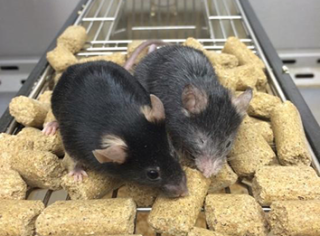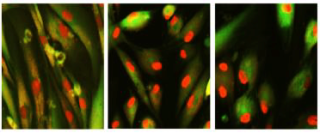Is it possible to reverse aging and restore cellular function? Well, if the latest research holds firm to global scientific scrutiny, then the answer is yes. A new priority research paper published in Aging, titled, “Chemically induced reprogramming to reverse cellular aging”, reports that researchers have unlocked a new frontier in the fight against aging and age-related diseases.
Unlocking a New Frontier in the Fight Against Aging and Age-Related Diseases
Conducted by a team of scientists at Harvard Medical, the researchers published the first chemical approach to reprogram cells in a younger state. In the past, this was only achievable using powerful gene therapy.
From Harvard University and the University of Massachusetts, the team of researchers includes:
- ae-Hyun Yang
- Christopher A. Petty
- Thomas Dixon-McDougall
- Maria Vina Lopez
- Alexander Tyshkovskiy
- Sun Maybury-Lewis
- Xiao Tian
- Nabilah Ibrahim
- Zhili Chen
- Patrick T. Griffin
- Matthew Arnold
- Jien Li
- Oswaldo A. Martinez
- Alexander Behn
- Ryan Rogers-Hammond
- Suzanne Angeli
- Vadim N. Gladyshev
- David A. Sinclair
The Harvard Medical findings and the Yamanaka factors, by Nobel Peace Prize Winner Shinya Yamanaka
In this study, the team’s findings add to the discovery. The expression of specific genes, called Yamanaka factors, could convert adult cells into induced pluripotent stem cells. This original Nobel Prize-winning discovery introduced whether it might be possible to reverse cellular aging without causing cells to become too young and turn cancerous.
Shinya Yamanaka, Kyoto University, Kyoto, Japan; Gladstone Institutes, San Francisco, CA, USA won the Nobel Prize in Physiology or Medicine in 2012.
The prize motivation was “for the discovery that mature cells can be reprogrammed to become pluripotent”
Yamanaka’s Life
According to NobelPrize.org, “Shinya Yamanaka was born in Higashiosaka, Japan. He studied for his medical degree at Kobe University and later earned his PhD from Osaka City University in 1993. After spending several years at the Gladstone Institute at the University of California, San Francisco, he returned to Osaka, but later moved to the Nara Institute of Science and Technology, where he began his Nobel Prize-winning research. ”
His work has been a foundation stone
NobelPrize.org, further explains his research. “Our lives begin when a fertilized egg divides and forms new cells that, in turn, also divide. These cells are identical in the beginning, but become increasingly varied over time. It was long thought that a mature or specialized cell could not return to an immature state, but this has now been proven incorrect.”
“In 2006, Shinya Yamanaka succeeded in identifying a small number of genes within the genome of mice that proved decisive in this process. When activated, skin cells from mice could be reprogrammed to immature stem cells, which, in turn, can grow into different types of cells within the body.” – NobelPrize.Org
Now the Harvard Study takes us closer to age rejuvenation
In this new study, the Harvard researchers screened for molecules that could, in combination, reverse cellular aging and rejuvenate human cells.
They developed high-throughput cell-based assays to determine the young cells from old and senescent cells. This includes transcription-based aging clocks and a real-time nucleocytoplasmic protein compartmentalization (NCC) assay. In an exciting discovery.
The team identified six chemical cocktails. Above all, it restores NCC genome-wide transcript profiles to youthful states and reverses transcriptomic age in less than a week.
Reverse Cellular Aging is Possible
Harvard researchers have previously demonstrated that it is possible to reverse cellular aging. In addition, this is without uncontrolled cell growth by virally introducing specific Yamanaka genes into cells. Studies on the optic nerve, brain tissue, kidney, and muscle have shown promising results. There’s even been improved vision and extended lifespan observed in mice. Recently, a report of improved vision in monkeys was also discovered.
The inklings of this new discovery are far-reaching, opening paths for regenerative medicine and, potentially, whole-body rejuvenation. By developing a chemical alternative to age reversal via gene therapy, this research could revolutionize the treatment of aging, injuries, and age-related diseases. It also offers the potential for lower costs and shorter timelines for development.
Reversing blindness in monkeys to slowing down aging
Preparations for human clinical trials of the lab’s age-reversal gene therapy were in progress following favorable results in reversing blindness in monkeys in April 2023
“Until recently, the best we could do was slow aging. New discoveries suggest we can now reverse it,” said David A. Sinclair, A.O., Ph.D., Professor in the Department of Genetics and co-Director of the Paul F. Glenn Center for Biology of Aging Research at Harvard Medical School. Sinclair is also the lead scientist on the project.
“This process has previously required gene therapy, limiting its widespread use.”
What the future may bring for reverse aging and restore cellular function
The Harvard team foresees a future where age-related diseases can be effectively treated and injuries can be repaired more efficiently. The dream of whole-body rejuvenation becomes a reality
“This new discovery offers the potential to reverse aging with a single pill, with applications ranging from improving eyesight to effectively treating numerous age-related diseases,” Sinclair said.
The Harvard Study at Work
Below is an image of mice in the Sinclair lab. To test the effectiveness of the therapies to reverse the aging process, the mice were engineered to age rapidly. The mouse on the right has been aged to 150% that of its sibling on the left by disrupting its epigenome.

Photo credit: D. Sinclair, Harvard Medical School
Another example of this new study is the image below, where we see the rejuvenation and age reversal of senescent human skin cells by chemical means. Cells on the right two panels have restored compartmentalization of the red fluorescent protein in the nucleus, a marker of youth that was used to find the cocktails. Previously, scientists confirmed that they were younger, based on how genes were expressed.

Image credit: J. -H. Yang, Harvard Medical School
The fight against aging and age-related diseases may have been uncovered
In conclusion, this monumental new discovery may be the answer to the fight against aging and age-related diseases. The result is simply life-changing. Above all, it may impact the future of human beings, as well as how we would age moving forward. We cannot encourage you enough to read the full study and further understand what may impact your future on aging.
References
NEW STUDY: Discovery of Chemical Means to Reverse Aging and Restore Cellular Function… | Aging (aging-us.com)
Nobel Peace Prize Facts: Shinya Yamanaka: https://www.nobelprize.org/prizes/medicine/2012/yamanaka/facts/



![women [longevity live]](https://longevitylive.com/wp-content/uploads/2020/01/photo-of-women-walking-down-the-street-1116984-100x100.jpg)










